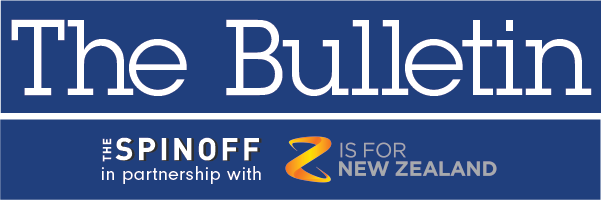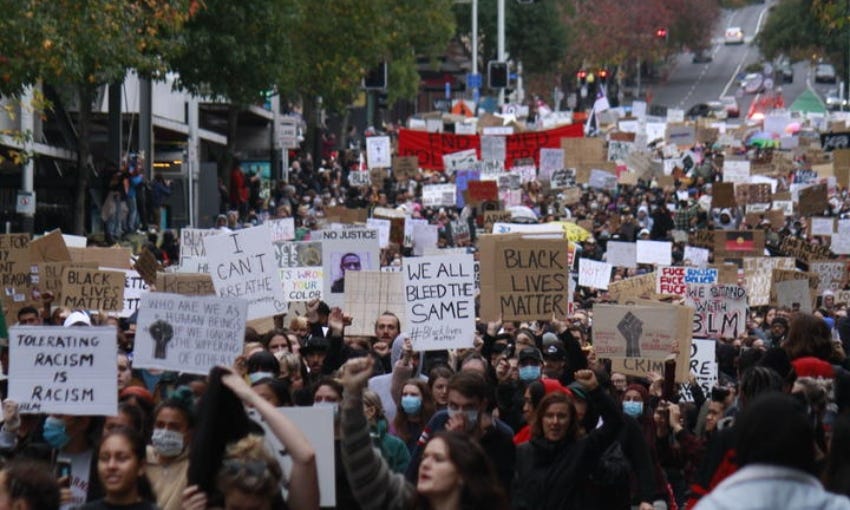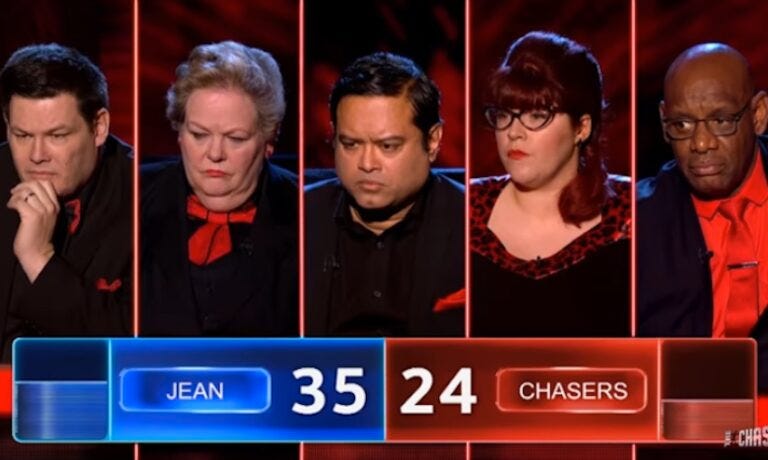US police violence and New Zealand protests
Thousands of people came out in solidarity with the Black Lives Matter movement

Good morning and welcome to The Bulletin for Tuesday 2 June, by Alex Braae for The Spinoff. Presented in partnership with Z Energy.
In today’s edition: Thousands of NZers join solidarity protests, increasing questions about alert level move, and Muller pushes hiring bonus policy.

Image: Black Lives Matter solidarity protesters in Auckland (Radio NZ, Leith Huffadine)
Protests have taken place in New Zealand cities in solidarity with the Black Lives matter movement in the US. All up thousands of people attended the various events, with a particularly large gathering in central Auckland yesterday afternoon. Our reporter Jihee Junn was on the scene and filed a series of reports to our live updates page. It was a large, passionate and vocal event, and also entirely peaceful.
But it follows a weekend of hideous violence in the US, much of it instigated by police. The original cause of the protests was the killing of Minneapolis man George Floyd, who is black, by a police officer who kneeled on Floyd's neck for almost eight minutes. But to say that what is happening now was caused by that is sort of like saying World War One was caused by the assassination of Archduke Franz Ferdinand – it was certainly the spark, but events are now unfolding with their own momentum. The Washington Post reports dozens of cities have sought to impose curfews, after days of peaceful protest gave way to nights of running battles, looting, and beatings. To give a sense of where things are at, The Hill reports US Senator Tom Cotton is urging President Trump to use the Insurrection Act against protesters, which would give himself the power to deploy active-duty military personnel to quell the uprisings. Trump himself has called on state governors to "dominate" protesters. We don't know to what degree police forces are already doing this, but some deeply telling examples have emerged – for example, a reporter who captured footage of himself being indiscriminately pepper-sprayed by a heavily armed officer.
While some might look at this as unconnected, there are very real and tangible reasons for people in New Zealand to fear racism and violence from police officers. People of African backgrounds spoke out in the past about this, saying they were targeted and harassed by officers. Police dogs are far more likely to be unleashed upon Māori youth, as opposed to kids of other ethnicities – one might wonder why such vicious creatures are being used on children at all, or on anyone for that matter. Recent research from JustSpeak shows that there are still vast structural biases against those who aren't Pākehā. And as for why many people might not trust the police in New Zealand – you don't have to go back far into the whakapapa of many Māori people to see land dispossession being supported by the police, or for Polynesian people living in fear of their door being broken down in a dawn raid. And just recently, the NZ Herald revealed that no consultation took place with Māori over the trial of armed police teams, despite Māori being at much greater risk of being shot.
But while all of that makes it clear that there are problems with how policing takes place in New Zealand, there is also a qualitative difference with the US. One of the most important distinctions that needs to be understood is that New Zealand's police force hasn't been militarised in the same way. Policing in the US now draws heavily from the tactics of various wars and foreign occupations of the last two decades. Military equipment is routinely given to ostensibly civilian police departments, for domestic use. The obvious problems that creates are explored in this piece on The Atlantic, or this piece on The Verge – it means that police come to see those they are policing as an enemy to be defeated and occupied. They become a law unto themselves, unaccountable and out of control.
The police in New Zealand – and the politicians they are supposed to be accountable to – have some very important choices to make here. The police has also in the past proven itself to be capable of structural change. The Bazley Report into a widespread culture of misogyny and covering up of sexual assault is proof – genuine changes for the better were made in the wake of that, even if everyone would acknowledge that there is more to be done. It should also be very clearly noted that police responded to these protests in New Zealand by standing back, even on top of Covid-19 restrictions – more on that below.
The recent trial of armed response teams had one positive outcome – not a single shot was fired by any of the teams during them. It shows both that police officers here aren't necessarily trigger-happy, and also shows that such an escalation of equipment is entirely unneeded. And unconnected to the trial, over the period it was running police still shot and killed several people who were themselves believed to be armed with weapons, in circumstances that are being investigated by the IPCA. The wider point about routinely armed police is put brilliantly by NZ Herald (paywalled) writer Siena Yates. These shouldn't be operational matters for the police to decide – they are fundamental questions about what our society should look like.
Finally, there might be a few people reading this who are looking at the police violence against protesters in the US, and cheering it on. And to that, I would advise those readers to be very careful about what they wish for. This sort of police-driven violence rarely stops where those calling for it expect.
Just quickly, a message from The Spinoff's managing editor Duncan Greive:
"The arrival of Covid-19 and lockdown changed The Spinoff, transforming our editorial to focus on the biggest story of our lives, taking a small team and making it a seven day a week news operation. But it also fundamentally changed us as a business, too. Prior to the crisis, around 20% of our editorial costs were funded by our Members. Now, that figure is north of 50%. The loss of some key commercial clients meant that change has to be permanent. If you're already a member, please know that all at The Spinoff are incredibly grateful for your help. If you're not, and can afford to contribute, please consider doing so – it really is critically important to our ability to cover the next phase of the crisis, in all its complexity."
Increasing questions are being raised about an immediate move to alert level one, not least because several thousand people just gathered together in Auckland. Even though some social distancing and protection measures were taken by marchers, a protest is almost the most dangerous possible event for any potential virus spread. People are close together, contact tracing is very difficult, and there is a lot of shouting – all of those are risk factors. Both Act leader David Seymour and deputy PM Winston Peters have drawn a direct link between the protest and a call to move to level one, while National leader Todd Muller made a more generalised call yesterday morning. Not that it necessarily works like this, but presuming the three of them all speak on behalf of their parties, that means a majority of parliament is now in favour of a move to level one. Expect PM Ardern to face a lot of questions about this over her morning interviews today.
Protesters have also been urged to now self-isolate for 14 days, as a precaution. The call came from Dr Siouxsie Wiles, who said many had not followed earlier warnings to wear masks and practice physical distancing. Earlier in the weekend, Dr Wiles outlined why in her view it is still too soon to move to level one.
National's first economic policy under the leadership of Todd Muller has been released. Stuff reports that businesses who employed a full time worker would be paid out $10,000, with the overall policy spend being capped at $500 million. Muller says the scheme is designed to get businesses hiring again after winter, and will send a signal to those businesses that the government will share in the risk of doing so. Speaking of which, National's new shadow minister for everything Amy Adams spoke to Newshub Nation over the weekend, about what her coordination role will mean for the party. Adams told the show that she'd be more than happy to see the government start the scheme earlier than National's date of November 1st – that is, if they get elected in September.
Queenstown has seen a massive weekend of domestic tourism, with Crux reporting that it was reminiscent of seasonal peaks in normal times. Some providers were even caught off guard by the rush. Stuff reports that such a boom was seen the length of the South Island, and it will be a deeply welcome result for regional economies that previously relied heavily on tourism.
I happened to spend the weekend in the rohe of the Waikato Times, and it was a phenomenally good read on Saturday. Lots of good local nuggets up front, and some solid national and international stories up the back. In particular, I want to highlight this story by Luke Kirkeby on a massive stoush over a South Waikato District Council poster, which has led to formal complaints and potential legal action. Even having never heard of any of the protagonists of the story, I was still deeply drawn in to their drama.
The broadcasting allocation for parties contesting the 2020 election has been announced. You can read my story on it here, and also note the following feedback from electoral law expert professor Andrew Geddis:
"As well as parties having to be registered by August 12 (which requires them getting 500 paying members who all are enrolled to vote), they also have to actually submit a list of candidates in order to get access to this money. Submitting a party list requires a deposit of $1000, which the micro parties will never see again. If a party doesn't register/submit a list of candidates, its allocation gets redistributed to the other parties. So those micro-parties at the bottom probably won't get anything at all. Also note that the money is not paid out to the parties directly - the Electoral Commission pays bills upon delivery of receipts."
Got some feedback about The Bulletin, or anything in the news?
Drop us a line at thebulletin@thespinoff.co.nz

Right now on The Spinoff: John Summers has written about the history of the jersey, an iconic item of clothing that is deeply part of New Zealand's sartorial culture. Meng Foon and Paul Hunt write about iwi checkpoints and the role of Te Tiriti in the recovery. A group of engineers write about the need for equity in the infrastructure-led recovery. Dr Geoff Wilmott writes about 'deep tech' and the opportunities it provides for the Māori economy. Mary Breheny looks at the concept of privilege, giving the apt analogy that it is like a tailwind while riding a bike. Caroline Moratti looks back on the strange world of under-18 clubbing nights in Dunedin. Henry Oliver gives a personal account of the PACE scheme – colloquially known as the artist dole – and how it helped him become the legend he is today. Tara Ward reviews Beat the Chasers, a new escalation of the best quiz show in the world.
And finally, this piece has been a long time coming. Managing editor Duncan Greive has interviewed NBR boss Todd Scott about his latest moves in an unforgiving industry, as the organisation pivots to being fully online. It's quite a read too, going deep into Scott's life story for clues about where things are at now.
For a feature today, a strange and somewhat touching story about the preservation of history. Al-Jazeera has visited the remote Albanian village of Labinot, where an elderly woman guards a statue of the former dictator Enver Hoxha. His regime is long gone, but for many, the memories linger. Here's an excerpt:
In 1968 during the commemoration of the 25th anniversary of the uprising, the statue of the young Hoxha in military attire was erected in front of the museum. In 1991, when communist rule collapsed in Albania, the museum closed its doors and Hoxha's statue was brought down. But it was left to the villagers to decide what to do with it. Instead of getting rid of it, they shielded it in the basement, without imagining that it would remain there for decades to come.
Sabire, encouraged by her fellow villagers, felt a moral duty to safeguard both the house and the statue, in memory of her late husband who, during his lifetime, served as the museum's administrator. Sabire does not mention politics. When asked about the reason she continues to guard the dictator's statue, she looks up, as if amazed by the question itself, and replies: "I cannot just toss it away ... "
Good news for rugby, with confirmation that a juiced-up version of the Farah Palmer Cup will go ahead this year. The NZ Herald reports that Black Ferns and Sevens stars will be part of the 13-team competition, which will take place in a North and South conference format, before the playoffs. It is set to begin in mid-August. Meanwhile, Super Rugby Aotearoa is now less than two weeks away, and Patrick McKendry has written about the prospects for the Blues and their new signing Beauden Barrett. The Auckland-based franchise had a strong start to the pre-Covid season, and I'm personally really looking forward to seeing them crash and burn against the Hurricanes.
That's it for The Bulletin. If you want to support the work we do at The Spinoff, please check out our membership programme




